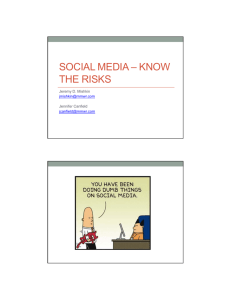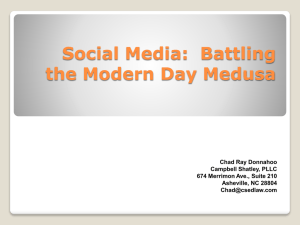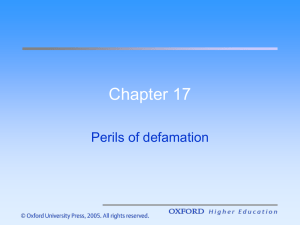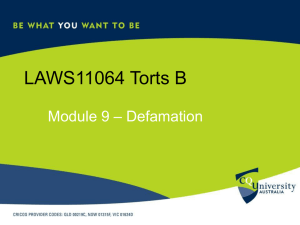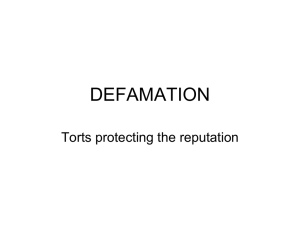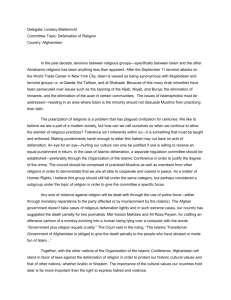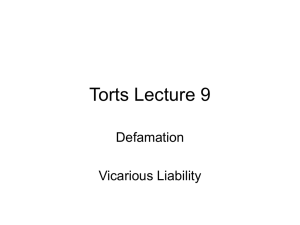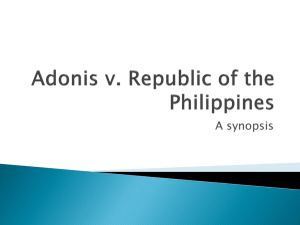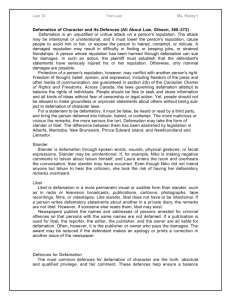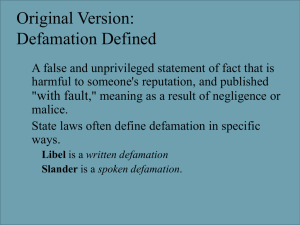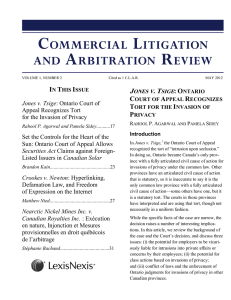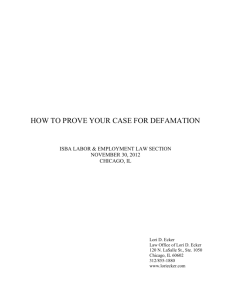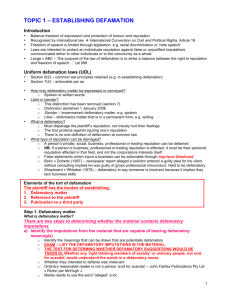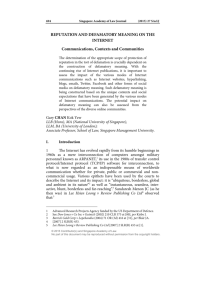Defamation by Wong Siew Hong, Director of Infinitus Law Corporation
advertisement
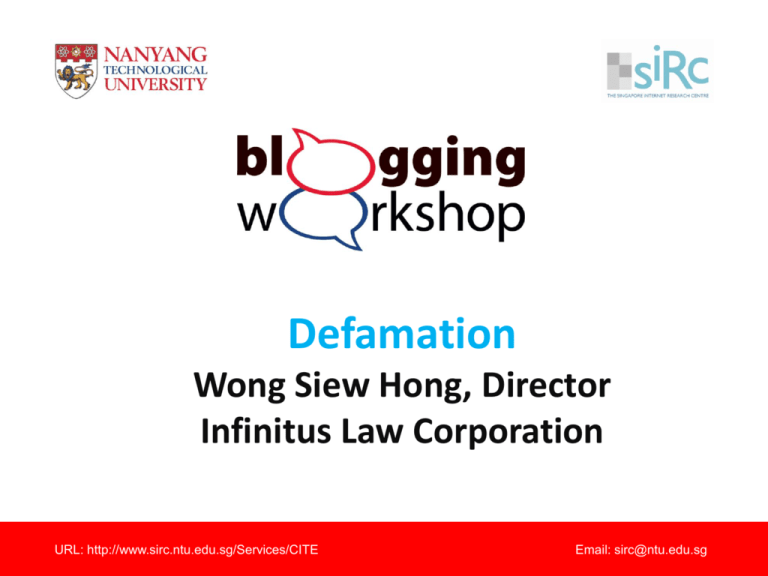
Defamation Wong Siew Hong, Director Infinitus Law Corporation URL: http://www.sirc.ntu.edu.sg/Services/CITE Email: sirc@ntu.edu.sg Nature of Defamation • ‘Defamation’ • The question of what sorts of comments would produce this effect is not easy to answer and will vary with changing social attitudes General Requirements of Defamation • The statement must be defamatory; • The words must refer to the Plaintiff; • It must have been published to a third party; and • The Defendant cannot rely on any of the defences Types of Defamation • Libel – Applies to comments which are recorded in some permanent form – in print or on tape • Slander – Reserved for comments which are more transient in nature Common Law Defences to Defamation • • • • Justification (or Truth) Fair Comment Absolute Privilege Qualified Privilege E-mail, Internet and World Wide Web • Law of libel applies • Doubt over chat rooms • Defence of ‘vulgar abuse’ – Statements made in the heat of an argument Communication • The Internet provides a superbly effective communications medium • E-mail permits cheap and swift communications of messages between individuals • Newsgroups allow anyone to express views on almost any topic under the sun • The World Wide Web permits individuals to establish themselves as electronic publishers E-Mails TJ Systems Pte Ltd and others v Ngow Kheong Shen [2003] SGHC 73 – The Defendant heard a rumour that the Plaintiffs were being investigated by CPIB for corruption and bribery – The Defendant wrote an internal e-mail to 15 other persons working in Cisco, alleging that the CPIB was reviewing information relating to projects awarded to the Plaintiff company and that CPIB had “strong” evidence of corrupt practices carried out by the Plaintiffs – Someone printed a copy of the e-mail and sent it anonymously to one of the Plaintiffs’ director E-Mails The High Court found that: • The Defendant had defamed the Plaintiffs and was unable to justify the truth of the defamatory allegations. • The Defendant had acted recklessly and was not able to avail himself of the defences of qualified privilege or fair comment. • The Defendant had acted irresponsibly by sending out an email containing such serious allegations without taking steps to verify what he had heard and embellishing the allegations in the process. E-mails Privileged/confidential information may be contained in this message. If you are not the intended address (or responsible for delivery to such person), you must not copy or deliver this message to anyone. Any use of its contents is strictly prohibited. Please destroy the message and notify the sender of this error. Linked content • A site can be created consisting of nothing but external links to other sites • Hird v Wood [1894] 38 SJ 235 – The Defendant sat in a chair pointing out to passersby a defamatory sign erected over the road – The author of the sign was unknown but the person pointing it out was found to have published it Godfrey v Demon Internet Ltd [2000] 3 WLR 1020 • The first English case on Internet defamation • Facts – The Plaintiff complained to the Defendant of a defamatory article on the Usenet news-server – The Defendant did not remove the defamatory material – The item remained on the Defendant’s newsserver until automatic expiry Godfrey v Demon Internet Ltd [2000] 3 WLR 1020 (cont’d) • • S.1 of the UK Defamation Act 1996 Three-level defence (s.1(1)) 1. He or she was not the author, editor or publisher of the defamatory statement. 2. He or she took reasonable care in relation to the statement’s publication 3. He or she did not know and had no reason to believe that what he or she did caused or contributed to the publication of a defamatory statement. Godfrey v Demon Internet Ltd [2000] 3 WLR 1020 (cont’d) • The Defendant satisfied the requirements of (1) but failed to meet those in (2) and (3) • The Defendant was not “the publisher of the posting defamatory of the Plaintiff and could therefore avail themselves of the defence in (1) above” Godfrey v Demon Internet Ltd [2000] 3 WLR 1020 (cont’d) • The Court held that the UK Defamation Act 1996 was not intended to cover those who were aware or were on notice that they were contributing to a defamatory publication • “publication” “In my judgment the Defendants, whenever they transmit and whenever there is transmitted from the storage of their news-server a defamatory posting, publish that posting to any subscriber to their ISP, who accesses the newsgroup containing that posting. Thus every time on of the Defendants’ customers accesses “soc.culture.thai” and sees that defamatory posting of the Plaintiff, there is a publication to that customer.” (at 1026) The position in Singapore • Ng Koo Kay Benedict v Zim Integrated Shipping Services Ltd *2010+ 2 SLR 860 on ‘publication’ • No equivalent of s.1 of the UK Defamation Act 1996 – Demon Internet’s defence irrelevant • However, the law should treat a publisher and a distributor differently The position in Singapore (cont’d) • The Electronic Transactions Act 2010 (formerly Cap. 88) s.26 – (1) Subject to subsection (2), a network service provider shall not be subject to any civil or criminal liability under any rule of law in respect of third-party material in the form of electronic records to which he merely provides access if such liability is founded on – (a) the making, publication, dissemination or distribution of such materials or any statement made in such material… The position in Singapore (cont’d) (3) In this section – “provide access”, in relation to third party material, means the provision of the necessary technical means by which third-party material may be accessed and includes the automatic and temporary storage of the third-party material for the purpose of providing access; “third-party”, in relation to a network service provider, means a person over whom the provider has no effective control The position in Singapore (cont’d) • Second reading of 1998 Bill • Prof Chin Tet Yung: “First of all, there is no definition of what a network service provider is. As the exemption from liability is extremely wide for network service providers, they are exempt from both civil and criminal liability in certain situations. It seems to me to be a serious omission not to have defined the technical term “network service providers” in the Bill. Leaving such a technical term for the judges to define may be to risk imprecision and create uncertainty” The position in Singapore (cont’d) • Contrast with Dr. Toh See Kiat: “I think the clause is too narrow in scope. Seemingly, it covers only Internet service providers (ISPs). It does not cover resellers of network services, such as Singapore Network Services, for example or America On Line…It does not cover search engine operators such as Yahoo and AltaVista…” • “network service providers” remains undefined Defences under Singapore Defamation Act (Cap. 75) • Section 7: Unintentional defamation 7 – (1) A person who has published words alleged to be defamatory of another person may, if he claims that the words were published by him innocently in relation to that other person, make an offer of amends under this section… Defences under Singapore Defamation Act (Cap. 75) (cont’d) ‘Offer of amends’ 7 – (3) An offer of amends under this section shall be understood to mean an offer – (a) in any case, to publish or join in the publication of a suitable correction of the words complained of, and a sufficient apology to the party aggrieved in respect of those words; (b) where copies of a document or record containing the said words have been distributed by or with the knowledge of the person making the offer, to take such steps as are reasonably practicable on his part for notifying persons to whom copies have been so distributed that the words are alleged to be defamatory of the party aggrieved. Defences under Singapore Defamation Act (Cap. 75) (cont’d) 7 – (5) For the purposes of this section, words shall be treated as published by one person (referred to in this subsection as the publisher) innocently in relation to another person if and only if the following conditions are satisfied: (a) that the publisher did not intend to publish them of and concerning that other person, and did not know of circumstances by virtue of which they might be understood to refer to him; or (b) that the words were not defamatory on the face of them, and the publisher did not know of circumstances by virtue of which they might be understood to be defamatory of that other person… Defences under Singapore Defamation Act (Cap. 75) (cont’d) …and in either case that the publisher exercised all reasonable care in relation to the publication; and any reference in this subsection to the publisher shall be construed as including a reference to any servant or agent of his who was concerned with the contents of the publication. Innocent Dissemination Elements (Emmens v Pottle (1885) 16 QBD 359): 1. The Defendant did not know that the work contained or was likely to contain libel; 2. The Defendant had no reason to suppose that the work contained a libel; and 3. The Defendant had exercised all reasonable care. CONCLUSION • The law of defamation applies equally to statements made on the Internet. Extends to – Bloggers – Social Media • If a claim is brought, the burden of proving one of the defences lies on the defendant and it is not easy to discharge. • It is also very costly to defend.
